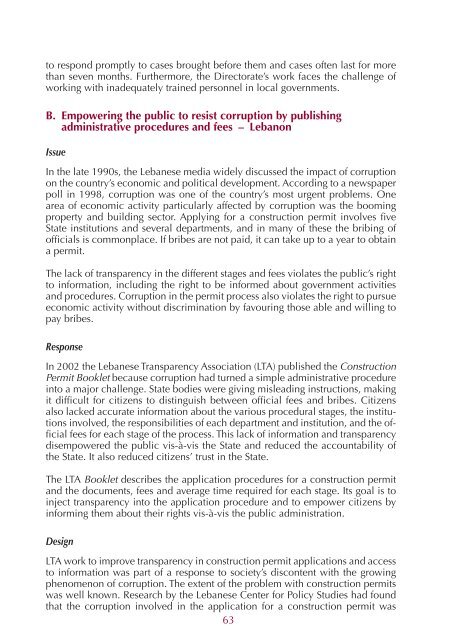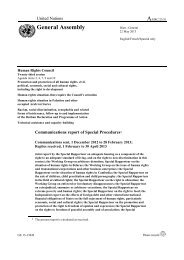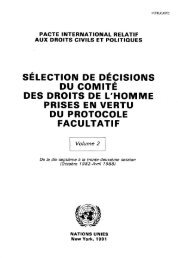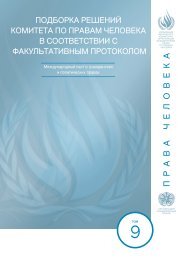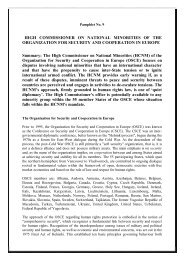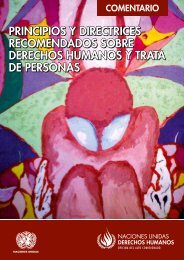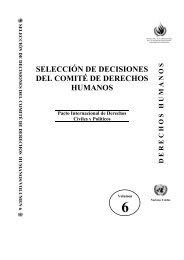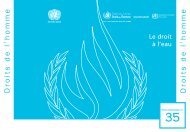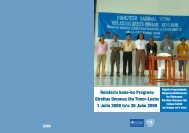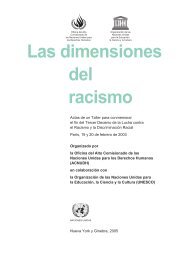good governance practices for the protection of human rights
good governance practices for the protection of human rights
good governance practices for the protection of human rights
Create successful ePaper yourself
Turn your PDF publications into a flip-book with our unique Google optimized e-Paper software.
to respond promptly to cases brought be<strong>for</strong>e <strong>the</strong>m and cases <strong>of</strong>ten last <strong>for</strong> more<br />
than seven months. Fur<strong>the</strong>rmore, <strong>the</strong> Directorate’s work faces <strong>the</strong> challenge <strong>of</strong><br />
working with inadequately trained personnel in local governments.<br />
B. Empowering <strong>the</strong> public to resist corruption by publishing<br />
administrative procedures and fees – Lebanon<br />
Issue<br />
In <strong>the</strong> late 1990s, <strong>the</strong> Lebanese media widely discussed <strong>the</strong> impact <strong>of</strong> corruption<br />
on <strong>the</strong> country’s economic and political development. According to a newspaper<br />
poll in 1998, corruption was one <strong>of</strong> <strong>the</strong> country’s most urgent problems. One<br />
area <strong>of</strong> economic activity particularly affected by corruption was <strong>the</strong> booming<br />
property and building sector. Applying <strong>for</strong> a construction permit involves five<br />
State institutions and several departments, and in many <strong>of</strong> <strong>the</strong>se <strong>the</strong> bribing <strong>of</strong><br />
<strong>of</strong>ficials is commonplace. If bribes are not paid, it can take up to a year to obtain<br />
a permit.<br />
The lack <strong>of</strong> transparency in <strong>the</strong> different stages and fees violates <strong>the</strong> public’s right<br />
to in<strong>for</strong>mation, including <strong>the</strong> right to be in<strong>for</strong>med about government activities<br />
and procedures. Corruption in <strong>the</strong> permit process also violates <strong>the</strong> right to pursue<br />
economic activity without discrimination by favouring those able and willing to<br />
pay bribes.<br />
Response<br />
In 2002 <strong>the</strong> Lebanese Transparency Association (LTA) published <strong>the</strong> Construction<br />
Permit Booklet because corruption had turned a simple administrative procedure<br />
into a major challenge. State bodies were giving misleading instructions, making<br />
it difficult <strong>for</strong> citizens to distinguish between <strong>of</strong>ficial fees and bribes. Citizens<br />
also lacked accurate in<strong>for</strong>mation about <strong>the</strong> various procedural stages, <strong>the</strong> institutions<br />
involved, <strong>the</strong> responsibilities <strong>of</strong> each department and institution, and <strong>the</strong> <strong>of</strong>ficial<br />
fees <strong>for</strong> each stage <strong>of</strong> <strong>the</strong> process. This lack <strong>of</strong> in<strong>for</strong>mation and transparency<br />
disempowered <strong>the</strong> public vis-à-vis <strong>the</strong> State and reduced <strong>the</strong> accountability <strong>of</strong><br />
<strong>the</strong> State. It also reduced citizens’ trust in <strong>the</strong> State.<br />
The LTA Booklet describes <strong>the</strong> application procedures <strong>for</strong> a construction permit<br />
and <strong>the</strong> documents, fees and average time required <strong>for</strong> each stage. Its goal is to<br />
inject transparency into <strong>the</strong> application procedure and to empower citizens by<br />
in<strong>for</strong>ming <strong>the</strong>m about <strong>the</strong>ir <strong>rights</strong> vis-à-vis <strong>the</strong> public administration.<br />
Design<br />
LTA work to improve transparency in construction permit applications and access<br />
to in<strong>for</strong>mation was part <strong>of</strong> a response to society’s discontent with <strong>the</strong> growing<br />
phenomenon <strong>of</strong> corruption. The extent <strong>of</strong> <strong>the</strong> problem with construction permits<br />
was well known. Research by <strong>the</strong> Lebanese Center <strong>for</strong> Policy Studies had found<br />
that <strong>the</strong> corruption involved in <strong>the</strong> application <strong>for</strong> a construction permit was<br />
63


